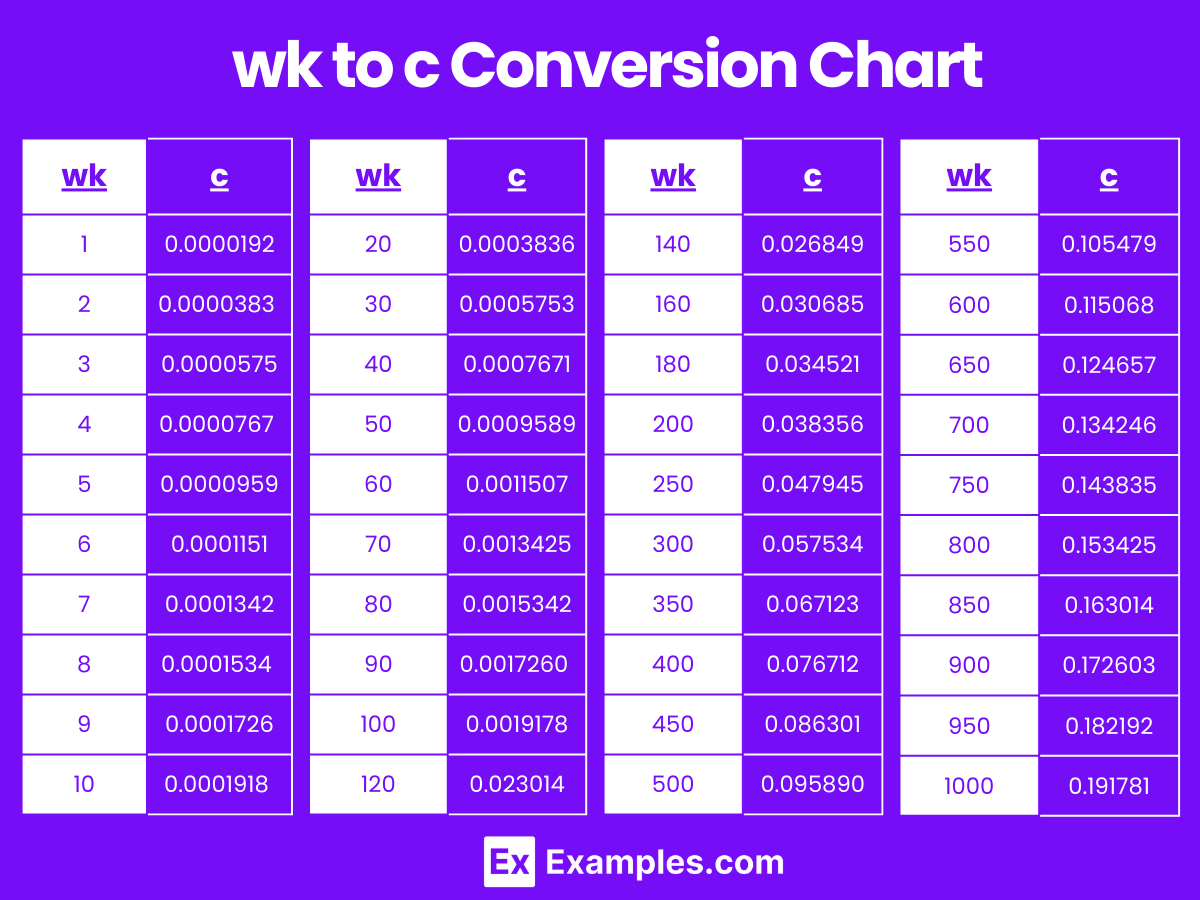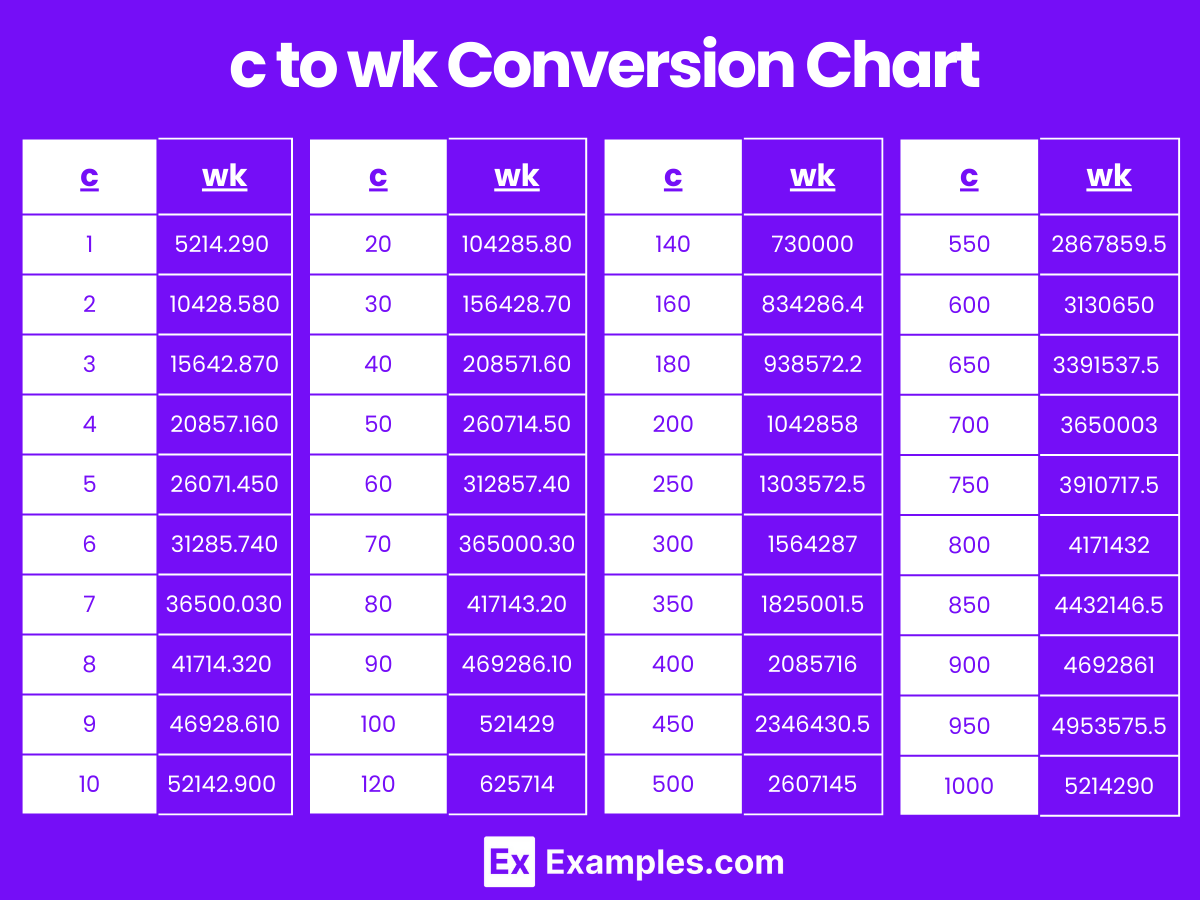Convert weeks to centuries and vice versa effortlessly at Examples.com. Input your numbers for fast and accurate conversions.
wk to c
Formula: Time in centuries(c) = Time in weeks(wk) ∕ 5217.75
Weeks :
centuries :
| weeks | centuries |
|---|---|
| 1 | 0.00019165349048919553 |
c to wk
Formula: Time in weeks(wk) = Time in centuries(c) x 5217.75
centuries :
Weeks :
| centuries | weeks |
|---|---|
| 1 | 5217.75 |
Time Converters to Week (wk)
| Nanosecond to Week | Microsecond to Week | Millisecond to Week |
| Second to Week | Minute to Week | Hour to Week |
| Day to Week | Month to Week | Calendar Year to Week |
| Decade to Week | Century to Week |
Time Converters to Century (c)
Conversion Factors:
- Weeks to Centuries: 1 century = 5,217.75 weeks
- Centuries to Weeks: 1 week = 1/5,217.75 centuries
How to Convert Weeks to Century:
To convert weeks to centuries, divide the number of weeks by 5,217.75.
Centuries=Weeks/5,217.75
Example:
Convert 10,000 weeks to centuries.
Centuries=10,000/5,217.75=1.915 centuries
How to Convert Century to Weeks:
To convert centuries to weeks, multiply the number of centuries by 5,217.75.
Weeks=Centuries×5,217.75
Example:
Convert 2 centuries to weeks.
Weeks=2×5,217.75=10,435.5 weeks
Week to Century Conversion Table
| Weeks (wk) | Centuries (c) |
|---|---|
| 1 wk | 0.0000192 c |
| 2 wk | 0.0000383 c |
| 3 wk | 0.0000575 c |
| 4 wk | 0.0000767 c |
| 5 wk | 0.0000959 c |
| 6 wk | 0.0001151 c |
| 7 wk | 0.0001342 c |
| 8 wk | 0.0001534 c |
| 9 wk | 0.0001726 c |
| 10 wk | 0.0001918 c |
| 20 wk | 0.0003836 c |
| 30 wk | 0.0005753 c |
| 40 wk | 0.0007671 c |
| 50 wk | 0.0009589 c |
| 60 wk | 0.0011507 c |
| 70 wk | 0.0013425 c |
| 80 wk | 0.0015342 c |
| 90 wk | 0.0017260 c |
| 100 wk | 0.0019178 c |
wk to c Conversion Chart

Century to Week Conversion Table
| Centuries | Weeks |
|---|---|
| 1c | 5214.290 wk |
| 2c | 10428.580 wk |
| 3c | 15642.870 wk |
| 4c | 20857.160 wk |
| 5c | 26071.450 wk |
| 6c | 31285.740 wk |
| 7c | 36500.030 wk |
| 8c | 41714.320 wk |
| 9c | 46928.610 wk |
| 10c | 52142.900 wk |
| 20c | 104285.800 wk |
| 30c | 156428.700 wk |
| 40c | 208571.600 wk |
| 50c | 260714.500 wk |
| 60c | 312857.400 wk |
| 70c | 365000.300 wk |
| 80c | 417143.200 wk |
| 90c | 469286.100 wk |
| 100c | 521429.000 wk |
c to wk Conversion Chart

Difference Between Week to Century
| Aspect | Week (wk) | Century (c) |
|---|---|---|
| Definition | A period of 7 days. | A period of 100 years. |
| Duration | Short-term unit of time. | Long-term unit of time. |
| Common Usage | Used for planning and scheduling. | Used for historical and long-term context. |
| Conversion Factor | 1 week = 0.0000192 centuries. | 1 century = 5,217.4 weeks. |
| Historical Events | Covers minor events and tasks. | Covers significant historical changes and eras. |
| Calendar Context | Part of a month or year. | Part of a millennium. |
| Perception | Easily relatable and manageable. | Vast and abstract for daily life. |
| Example | A typical workweek or vacation. | The duration of the 20th century. |
| Measurement Use | Practical for short-term goals. | Practical for understanding historical timelines. |
| Scientific Relevance | Used in biological and medical studies. | Used in geological and astronomical studies. |
1. Solved Examples on Converting Week to Century
Example 1: Converting Weeks to Centuries
Problem: Convert 10,000 weeks to centuries.
Solution: Centuries=10,000 weeks/5,217.75 weeks/century=1.92 centuries
Example 2: Converting Weeks to Centuries
Problem: Convert 20,000 weeks to centuries.
Solution: Centuries=20,000 weeks/5,217.75 weeks/century=3.83 centuries
Example 3: Converting Weeks to Centuries
Problem: Convert 30,000 weeks to centuries.
Solution: Centuries=30,000 weeks/5,217.75 weeks/
Example 4: Converting Weeks to Centuries
Problem: Convert 40,000 weeks to centuries.
Solution: Centuries=40,000 weeks/5,217.75 weeks/century=7.66 centuries
Example 5: Converting Weeks to Centuries
Problem: Convert 50,000 weeks to centuries.
Solution: Centuries=50,000 weeks/5,217.75 weeks/century=9.58 centuries
2. Solved Examples on Converting Century to Week
Example 1: Converting Centuries to Weeks
Problem: Convert 1 century to weeks.
Solution: Weeks=1 century×5,217.75 weeks/century=5,217.75 weeks
Example 2: Converting Centuries to Weeks
Problem: Convert 2 centuries to weeks.
Solution: Weeks=2 centuries×5,217.75 weeks/century=10,435.5 weeks
Example 3: Converting Centuries to Weeks
Problem: Convert 3 centuries to weeks.
Solution: Weeks=3 centuries×5,217.75 weeks/century=15,653.25 weeks
Example 4: Converting Centuries to Weeks
Problem: Convert 4 centuries to weeks.
Solution: Weeks=4 centuries×5,217.75 weeks/century=20,871 weeks
Example 5: Converting Centuries to Weeks
Problem: Convert 5 centuries to weeks.
Solution: Weeks=5 centuries×5,217.75 weeks/century=26,088.75 weeks
Can I use a simple calculator to convert weeks to centuries?
Yes, you can use a simple calculator to divide the number of weeks by 5,217.75 to get the number of centuries.
Is the conversion from weeks to centuries precise?
The conversion is based on the average number of weeks in a year (52.1775), which assumes a year is exactly 365.25 days. It is accurate for general purposes, but minor discrepancies may occur due to leap years.
How can this conversion be useful in real life?
This conversion is useful for understanding long time spans in historical research, planning large-scale projects, or in educational contexts to teach time measurement and conversions.
How do leap years affect the conversion from weeks to centuries?
Leap years slightly adjust the average number of days in a year to 365.25, resulting in the 52.1775 weeks per year approximation.
What is the importance of understanding the conversion between weeks and centuries?
Understanding the conversion between weeks and centuries helps in grasping long time spans, which is useful in fields like history, astronomy, and project planning, providing a better context for time management and historical analysis.
What are some practical applications of converting weeks to centuries?
Practical applications include historical research, long-term project planning, scientific studies involving long time spans, economic forecasting, and educational purposes to help students understand large units of time.

